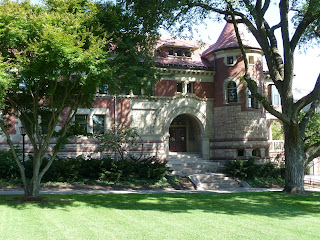
Meditations on Michael S. Harper’s Use Trouble
Use Trouble by Michael S. Harper
University of Illinois Press, 2009
Afaa Michael Weaver
November 14, 2009
Michael S. Harper’s most recent collection of poetry is Use Trouble, a glance over many years, a peering into the spaces between chance and opposition, between no way out and the promise of change.
When he told me about his new book about it in an email exchange, I ordered it immediately. I was in Taiwan and had it shipped to my office in Boston. Later I settled back into my apartment here in Somerville and sat at my kitchen table holding it in my hands the way I do when a friend puts a gift into the world this way, a new book. I mark the time that I have known Harper as beginning in the fall semester of 1986, when I sat in his Volvo with him and his daughter Rachel as he lectured me on the need to know metrics, as meter is to poetry what the notation of sound is to music. He later told me that I would find the assignments for his graduate poetry workshop in my mailbox. He put trouble in my line that evening. He launched me into his rigorous pedagogy... the metric exercises , the lectures, the meditations on craft and form.
So I sat at my kitchen table and felt the inspiration to write about the man I have known for twenty-three years, the poet, the teacher the mentor, the friend.
That night we sat in the Volvo we were on Thayer Street, Brown University’s main campus drag for hanging out. On that same street a few weeks later, I stood one morning waiting in line in a convenience store to pay for a snack. It was just a five minute walk from the graduate dormitory where I lived in my second year in the writing program. In Baltimore I had made history, graduating from years of factory work with a dual diploma, one a book in Charles Rowell’s Callaloo series and the other a fellowship from the National Endowment for the Arts. It had not been done before, at least not in Baltimore where I had a acquired a certain fame, so much so that one friend questioned why I even wanted to go to graduate school. Jonetta Barras, now a Washington journalist, believed I had already acquired, at the tender age of thirty-three, enough skills and way with the hand--creative mojo in poetry--to be able to go out into the world. I thought otherwise. I felt I needed time to read, think, and get a set of licenses, some high powered backing before heading into academia. As Bob Greene, a Baltimore journalist, said to me, “A nickel and talent won’t get you into the circus.”
It was a bright morning in early fall of 1986, some twenty-three years ago, and I turned around to see Michael S. Harper standing behind me. He is a good two inches taller and a good deal heavier, but there he was, as silent as a cat, and when I turned around he smiled that smile that is mostly mischief and which those of us who have studied with him know very well. It is also the smile of the little boy who hooked school to ride the subways of New York alone in the forties, worrying his mother and striking out in a bold way into the world in the way black poets have had to do for so long. It is also the smile of a father.
Three years earlier, in 1983, the original manuscript of my first book of poetry had been chosen as a finalist by Harper for the Walt Whitman Prize from the Academy of American poets. There were forty finalists out of over a thousand applicants, and the poet who won was my age and has since passed away. His name was Christopher Gilbert. Gilbert was a fine poet, and I regret never having had the chance to meet him. The notice of my finalist ranking came when I was living in a house that I rented with the option to buy. My wife loved the house and wanted to buy it, but the marriage did not have enough collateral. It had instead accrued excessive damage, or trouble. I made note of Harper’s name in the letter announcing my finalist standing, as I had read his work in journals, and I thought it might be good to go where he was teaching. When I saw that George Bass was also at Brown, I began assembling my application materials. In the warehouse where I worked, my coworkers laughed themselves silly when I told them I had applied to Brown University. I had been in factory work for fourteen years and was the janitor in the place.
Harper walked with me outside that morning at the store, and on our way up the street he talked about his struggle with bourgeois opposition in academia. His way of teaching is his way of being. If you listen and watch, you will see and understand what is otherwise too often indecipherable. He loves metaphors and signs, pieces of things, suggestions of what can be real. He is a lover of history, and if you enter that stream with him in conversation, you can walk with him along important paths, paths whose importance are known to many poets. At the Cave Canem retreat in the old monastery, its first meeting ground before moving to Pennsylvania, Harper relayed a conversation he had at Tuskegee with an elderly man who was a disciple of Booker T. Washington. Harper recounted the man’s reverence for Washington, who has beend dead for nearly a century. The message there was about historical continuity...and trouble.
When I read at the 92nd Street Y in New York for Karl Kirchwey some years ago, it was with Elizabeth Alexander, and it was around the time of the publication of her first book. Harper introduced us. Later in an outer room, a young white woman poet posed an academic question in a gesture suggesting an invitation to intellectual sparring, and I responded quickly with a reference to a Yoruba entity, something she did not know. Harper said as he as said to me on other occasions, “Well done, Michael.”
The man had already reinforced in me something I had suspected for many years, namely the political nature of the power of knowledge. What is important to other people may not be important or useful to me. The reverence given to a body of knowledge is one thing. My need to know a certain set of knowledge in order to pursue my writing is quite another cause for reverence.
In speaking of trouble, we can say the configuration of the relative power of knowledge can constitute trouble. There are all kinds of trouble.
There is age, life’s dwindling away.
At the Dodge festival at Waterloo in 1994, Harper and Lucille Clifton were in the hotel with me, and I had already known Lucille for nearly twenty years. Now I was chauffeur for both of them. One morning I drove us to the site of the festival, where I would keep Harper company. At one point we sat in the car and listened to the radio, a piece by Coltrane. It was 1994, and I had never taken the time to be very literate in music, literate enough to name the piece I am listening to in most cases, but Harper knew, of course.
“That’s Naima,” he said.
In the spring of my first year at Brown I took Piano and Theory with Nancy Rosenberg as an audit and preparation for research project in the blues and black theater history. So when I met Harper I had learned to read and write music, although my compositions were simplistic and in no way memorable. With Harper I began to think of prosody’s “significance” as comparable to that of music theory, but I discovered it as a process that I am still engaged in, still meditating on improvisation and abstractions in language. When it comes to naming the composition I am listening to, I am still not literate enough to name the tune.
The visual analogue of the melodic phrase of my time at the Dodge festival was a video clip of me walking behind Harper, a video that was part of Bill Moyer’s special on the festival. A student of mine from Rutgers was beside me, a woman who decided to study with me after reading a poem I wrote about Pearl Bailey. Her name was Karen, and there the two of us were, trailing behind Harper in the way of lineage, walking along as if on the rim of some mountain range or the edge of a perfect triad before it diminishes itself and becomes a blue note.
Poets gather and we are often glad to see one another, a joy that grows as I age, as I realize ambition is more trouble than I want these days. But the word is no good if it just sits in my home. I have to get up and get engaged. The world needs me to be who we are, all of us, wherever we are in meter or the way we make note of sound and its regular or irregular life, its consonance and its dissonance.
The morning in the store on Thayer Street is one I treasure. I say “thank goodness” because it allows me to enjoy the man’s presence. If we have ever disagreed or argued or not spoken, it has been because I wanted his attention, and it has been because it is the way men like us communicate, black men who have had to stare down death in dangerous places. We are much as we were in that store on Thayer Street as poets, here today and for certain not here at some unforeseeable point in the future, although these heavy footsteps we make as two big black men are also the heavy steps we make as wordsmiths, beating out these things called poems in blacksmith shops of the mind that are hot and dangerous with the melting of life and worlds in life so that we can hammer them out on anvils. We name these anvils creativity and courage.



Comments